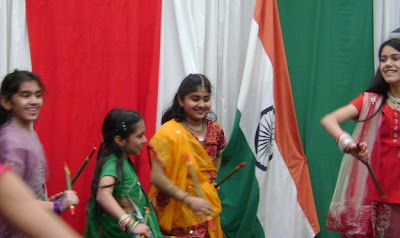 Camila and Jorge, my good Chilean friends and incredible chefs who prepared a traditional feast for us to indulge.
Camila and Jorge, my good Chilean friends and incredible chefs who prepared a traditional feast for us to indulge.Clams had with lemon, clams in a green salsa, another salsa similar to ceviche without seafood, empanadas, shish-kabobs (seen below), alfahores (dulce de leche sandwiched between biscuits), chicha (traditional Chilean liquor) and Chilean wines.
 Camila, Jorge, Jorge's sister Pilar, and Nima, an exchange student from Canada and Germany who's family is originally from Iran. Camila is a law student, Jorge studies engineering, Pilar is an art professor, and Nima studies marketing/economics. We had a wonderful time talking about various cultures and languages including English, Spanish, Hindi, Farsi, and German. Jorge's family is orginally descended from Germany and Spain.
Camila, Jorge, Jorge's sister Pilar, and Nima, an exchange student from Canada and Germany who's family is originally from Iran. Camila is a law student, Jorge studies engineering, Pilar is an art professor, and Nima studies marketing/economics. We had a wonderful time talking about various cultures and languages including English, Spanish, Hindi, Farsi, and German. Jorge's family is orginally descended from Germany and Spain.
 Camila, Jorge, Jorge's sister Pilar, and Nima, an exchange student from Canada and Germany who's family is originally from Iran. Camila is a law student, Jorge studies engineering, Pilar is an art professor, and Nima studies marketing/economics. We had a wonderful time talking about various cultures and languages including English, Spanish, Hindi, Farsi, and German. Jorge's family is orginally descended from Germany and Spain.
Camila, Jorge, Jorge's sister Pilar, and Nima, an exchange student from Canada and Germany who's family is originally from Iran. Camila is a law student, Jorge studies engineering, Pilar is an art professor, and Nima studies marketing/economics. We had a wonderful time talking about various cultures and languages including English, Spanish, Hindi, Farsi, and German. Jorge's family is orginally descended from Germany and Spain.

















